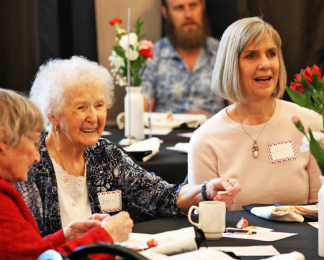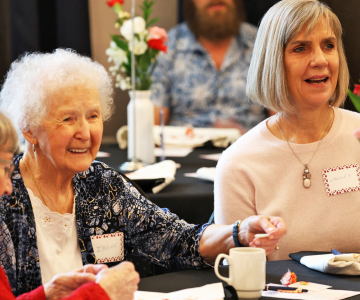Michelle Hewitt has had a lot of experience receiving health care. She is also a passionate advocate for people with disabilities, a former school principal and an academic. Her unique perspective and history are a few of the reasons she has been asked to contribute her thoughts on Interior Health programs and services.
Michelle is a patient partner and a member of the Patient Voices Network, a community of patients, families and caregivers in B.C. who work with organizations like Interior Health to improve our health-care system.
Patient participation is an important component of how new services and programs are developed. Interior Health benefits greatly from having the perspective of those receiving health-care services.
But patient partners bring far more than their experience as a patient to the table. They offer a unique view based on their professional training, past work experience and unique encounters with our health-care system.
What led you to becoming a patient partner?
"I became involved because it's important me to be an advocate for disabled people," says Michelle. "I have participated in other types of volunteer opportunities, but I wanted to have an impact closer to home. I responded to be a volunteer for a local project that had patient involvement in research and then continued to work with other Interior Health projects."
"To be honest, I struggle with the word patient. Everyone in our region is could consider themselves a patient as we all receive some type of health care. We're just people. As people, the experience we go through is very individual. It's also collective because as groups of people we go through the same experiences."
Beyond your unique perspective, what else do you bring to this partnership?
"Prior to being diagnosed with Multiple Sclerosis, I was a school principal with school district 23. Even though I no longer work in that capacity, I certainly bring that administrative lens to the work I'm engaged with. I am also working on my PhD at the moment. My research is focusing on care for young adults who live in long-term care homes. So I have a personal and an academic understanding of how these large systems work and what is required to affect change."
How do patient partners improve care?
"I think it's essential to have the people receiving programs and services involved in their development. As patient partners, we bring the focus back to the experience of the person receiving care. That's an important lens to have in these discussions."
"Don't get me wrong, having patient involvement is hard. It's messy and complicated and requires some difficult conversations. But it's also absolutely necessary."
These stories are built on the work originally started by Tatianna Henderson, Student Intern, Quality & Patient Safety.














